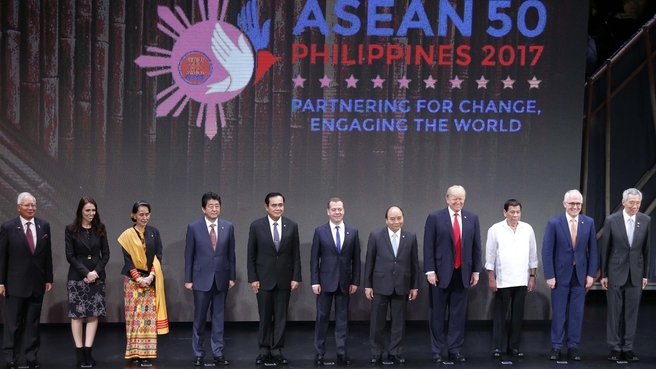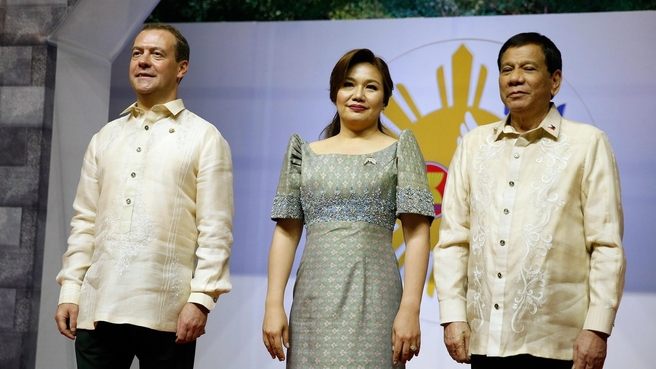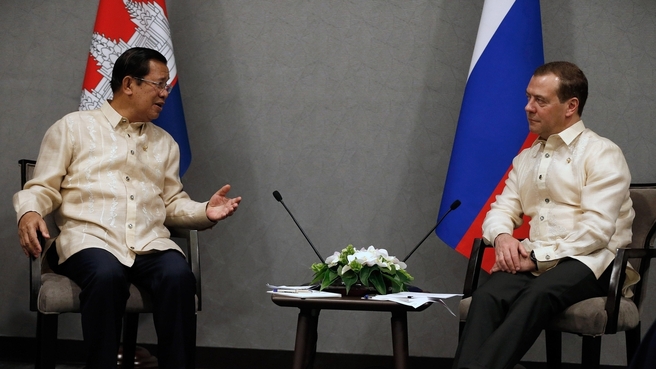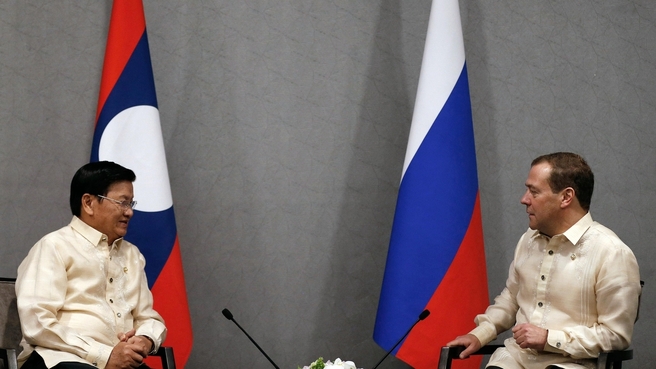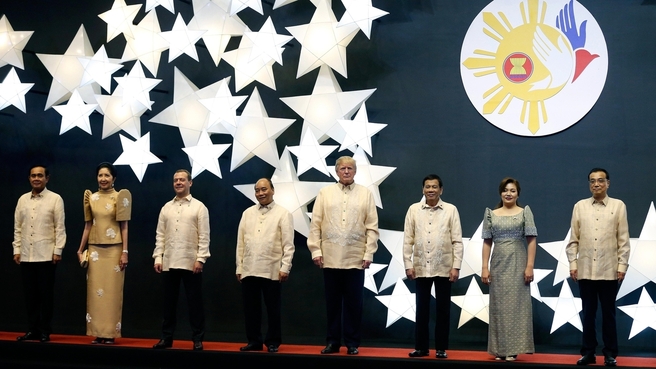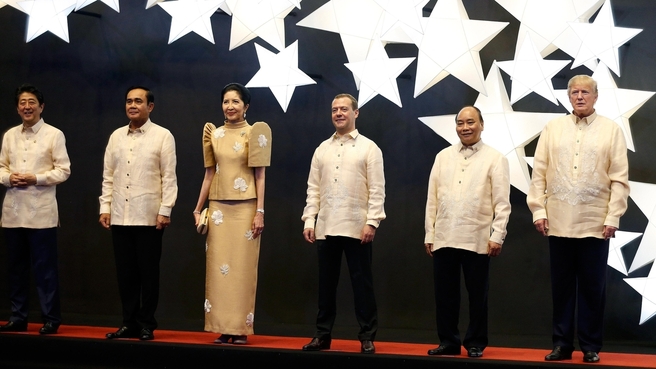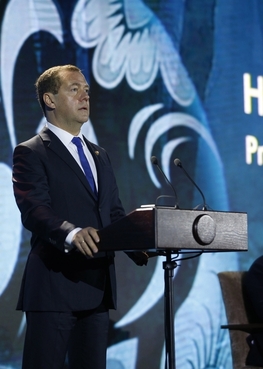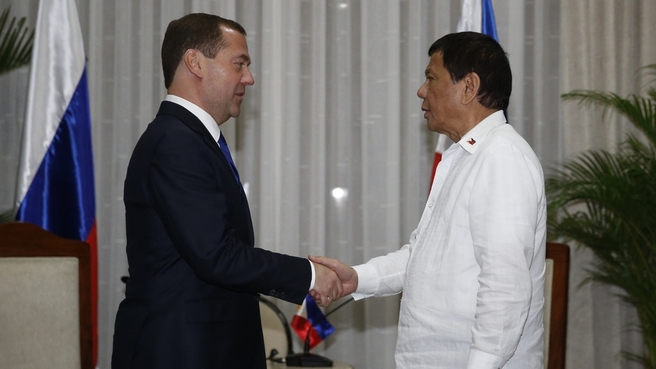The theme is Building for the Future (Infrastructure Development).
Answers to session participants’ questions
Excerpts from Dmitry Medvedev’s remarks at the first session of the ASEAN Business and Investment Summit 2017:
Delegation heads from ASEAN economies and Dialogue Partners
Efforts to regulate international trade are still locked in an old paradigm that dates back 40 years despite the rapid advances in e-commerce and digital technology. There is persistent instability on the commodity markets, corporate and public debt are adding up and so-called neo-protectionist policies are used with increased frequency, making economic sanctions a competitive tool.
Visit
-
Dmitry Medvedev’s news conference following the 31st ASEAN Summit and the 12th East Asia Summit
-
Dmitry Medvedev's meeting with Prime Minister of Vietnam Nguyen Xuan Phuc
-
Dmitry Medvedev’s meeting with President of South Korea Moon Jae-in
-
Dmitry Medvedev meets with President of the Philippines Rodrigo Duterte
-
Dmitry Medvedev meets with Prime Minister of Laos Thongloun Sisoulith
-
Dmitry Medvedev's meeting with Prime Minister of Singapore Lee Hsien Loong
-
Dmitry Medvedev's meeting with Cambodian Prime Minister Hun Sen
Russia is looking for ways to adapt to the new economic reality. We succeeded in improving our national economy to some extent by adjusting its development path slightly and reducing its excessive dependence on commodity exports. This positive momentum became visible last year and into 2017. Growth is recovering in Russia with GDP expected to increase 2 percent by the end of the year.
This economic policy focuses on providing anti-crisis support to high-potential industries and the banking sector. Some measures remain in place even now, as is the free float of the national currency and inflation targeting. We keep a close eye on the budget deficit in order to ensure that the budget is balanced while the price of oil remains relatively low.
We are addressing structural imbalances, and there is positive momentum in economic sectors that are not related to oil and gas. They benefit from competitive advantages on the domestic market.
Russia currently has a trade surplus, and an opportunity to expand its currency reserves. Against this backdrop, it makes perfect sense that foreign investors are increasingly interested in Russian projects. In the first six months of 2017, foreign direct investment increased by more than 100 percent.
We are facing the complex and challenging task of promoting international cooperation in information technology, encouraging e-commerce and cross-border business activity, while also ensuring national and information security. Russia is ready to engage proactively in these efforts. In fact, we have already adopted a special strategy for the development of an information society and a programme on the digital economy.
For more than 20 years, Russia and ASEAN have cooperated in the special framework of a dialogue partnership, focusing on trade and investment promotion, although trade volumes remain quite modest.
We see genuine interest within the business community of our countries to cooperate on energy, transport, agriculture, satellite navigation, high technology, financial services, and in almost all possible areas.
From 2014 to 2017 alone, Russia sent high-profile business missions to Indonesia, Malaysia, Singapore, Vietnam, Cambodia, Brunei-Darussalam, Myanmar and the Philippines.
Russia is also ready to contribute to ASEAN initiatives to develop energy, transport and information infrastructure. Offering the most efficient transport routes is a priority for us. We are developing seaports and airport infrastructure in Russia’s Far East and are building cross-border oil and gas pipelines.
The main goal of all these efforts is to ensure maximum efficiency in cargo transport between Asia and Europe and create a major transport and industrial hub in Russia’s Far East to serve the Asia-Pacific Region.
More than 500 joint investment projects have already been launched in Russia’s Far East. Only recently, we held the Eastern Economic Forum there, during which contracts worth almost $50 billion were signed.
Having a large market with clear regulations and developed infrastructure is a key prerequisite for business success. We wanted to create an environment of this kind within a new integration body, the Eurasian Economic Union, which, at this point, includes Russia and four other countries.
Together with our EAEU partners, Russia is interested in broad cooperation with the ASEAN countries. The first full free trade agreement between the EAEU countries and an ASEAN member state, Vietnam, came into force last year. We have recently completed talks on a similar agreement with China, and there is ongoing discussion of the creation of a multilateral free trade area between EAEU and ASEAN. We are also conducting separate talks on this matter with specific ASEAN countries.
Russia belongs to the Asia-Pacific Region in terms of its geopolitics, history and economy. Promoting cooperation with all countries within the region and contributing proactively to resolving regional issues is a strategic priority for us.
Excerpts from Dmitry Medvedev’s answers to session participants’ questions:
Question: Russia has achieved great success and a high level of competence in infrastructure technology. What role can Russia play in accelerating the implementation of the Master Plan on ASEAN Connectivity 2025 and strengthening cooperation between Russia and our region in this regard?
Dmitry Medvedev: We are willing to provide our infrastructure capacities to all ASEAN economies. This includes airports and seaports, railways, roads, pipelines, powerlines and high-speed communication channels.
These opportunities may be available with due account for prospective cooperation, even more so because in the past years a wide range of major infrastructure project have been completed.
We are currently preparing for the 2018 World Cup that Russia will be hosting next year.
We also see great potential in developing the Northern Sea Route. We have improved the major corridors in our country, including the Baikal-Amur Mainline and the Trans-Siberian Railway that connect Europe and Asia. We also continue to develop international transport corridors. All of our experience is available to our ASEAN partners.
For example, Russian Railways is participating in a large project to build complex infrastructure in Kalimantan (Borneo) in Indonesia, including a new railway and a coal transport terminal.
There are examples of investment in Russian infrastructure. In particular, Singapore’s Changi Airports International has invested in the development of an air hub in Vladivostok.
Question: What is Russia’s strategic stance regarding the ASEAN Economic Community?
Dmitry Medvedev: The ASEAN Economic Community is a partner with great potential and with a substantial degree of regional integration.
Of course, there are many challenges for ASEAN countries, including drastic gaps in socioeconomic development. There are difficulties in logistics and transport. There is instability and increasing favouritism in the markets. All these threats affect the ASEAN Economic Community as well. But I am certain it is possible to mitigate these.
This is our idea of cooperation between Russia and ASEAN. The trade between Russia and the ASEAN Economic Community is still rather low and remains under $15 billion a year. Trade has increased by one-third in the past year but the potential is much higher, perhaps ten times greater.
Last year in May, the ASEAN-Russia Summit in Sochi became a milestone in our relations with ASEAN. I hope it will also give a strong impetus to building a strategic partnership between our countries, the Eurasian Economic Union and the ten ASEAN economies.
Question: How can you encourage Russian business people’s interest in Asia and Asian markets? What do you think about inviting Asian companies to your country? What can you do to motivate Asian businesses to expand into the Russian market?
Dmitry Medvedev: I think we are doing exactly that. Over the past few years, I have visited Cambodia, Laos and Myanmar. Our business missions were also sent there. We will organise visits by companies from all ASEAN economies, including the three countries I just mentioned, to Russia.
Last year, ASEAN’s foreign trade exceeded $2.22 trillion. Russia’s commercial relations are much more modest. The Russian Government is pushing this type of contacts forwards but it is also important to develop direct relationships between business representatives.
In October, Russia and ASEAN agreed on a plan of action in science, technology and innovation. I hope that the business community will also find a place in these plans. We have approved an energy development programme through 2020. There are programmes on agriculture, food security and tourism with ASEAN economies. All these programmes can make an additional contribution to our interaction.
It is very important that business contacts also expand. The Russia-ASEAN Business Council that convened in May 2016 in Sochi, the ASEAN Business Advisory Council, the Chamber of Commerce and Industry and business clubs in specific countries – all these contacts will be encouraged by the Russian Government and by our public business association. I hope that it will give a new impetus to talks on establishing a free trade framework.
We (by which I mean the Eurasian Economic Union, an association of five member states) have so far only signed a free trade agreement with one ASEAN country, Vietnam. However, we are working out terms with a number of other states in Southeast Asia, including all of ASEAN, in general.
Question: What is your roadmap for helping small businesses in Russia move up the value chain to become medium and large enterprises?
Dmitry Medvedev: The ASEAN countries differ in terms of economic development. Some are more developed, and some are less, and there is persistent poverty, underdeveloped infrastructure, and issues with the development of education.
By working together, we can make our own contribution to resolving these matters, primarily through joint business initiatives, as well as educational and humanitarian initiatives and by seeking to help and support the ASEAN countries in general.
In the recent years, we have taken a number of measures designed to support small business. According to our estimates, some 50 to 60 percent of Russia’s population could be involved in projects undertaken by small businesses. So far, this figure is much lower. In fact, only about 25 percent of our population are involved in small entrepreneurship.
We have adopted several pieces of legislation to promote small business, including tax benefits and deductions related to production equipment leasing and to facilitating investment.
We also support small business by setting up government funds for carrying out various projects in this area. A fund specifically designed to support small businesses was recently created in Russia. It could benefit hundreds of thousands of small enterprises.
What matters most is that the state and the Government make this a priority.
